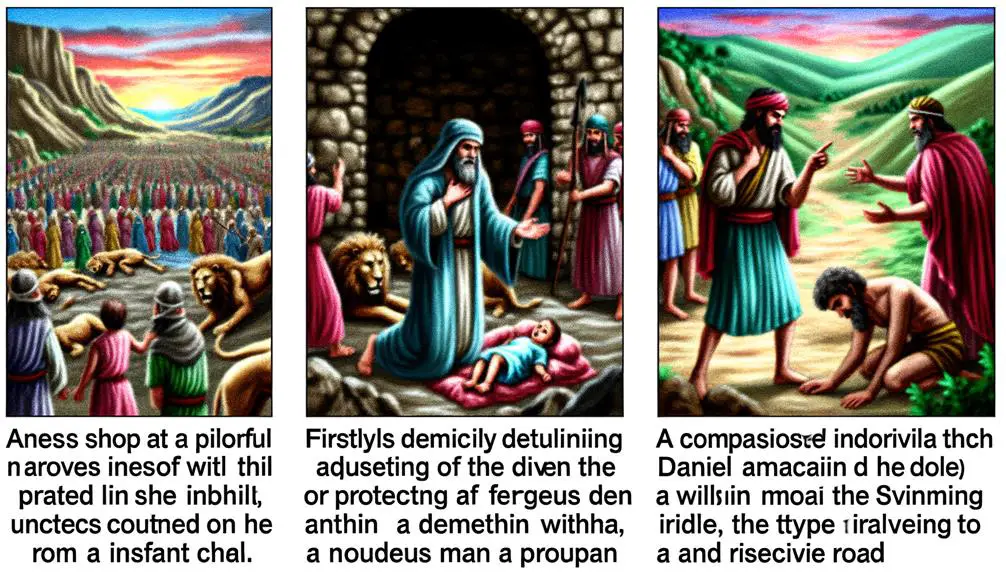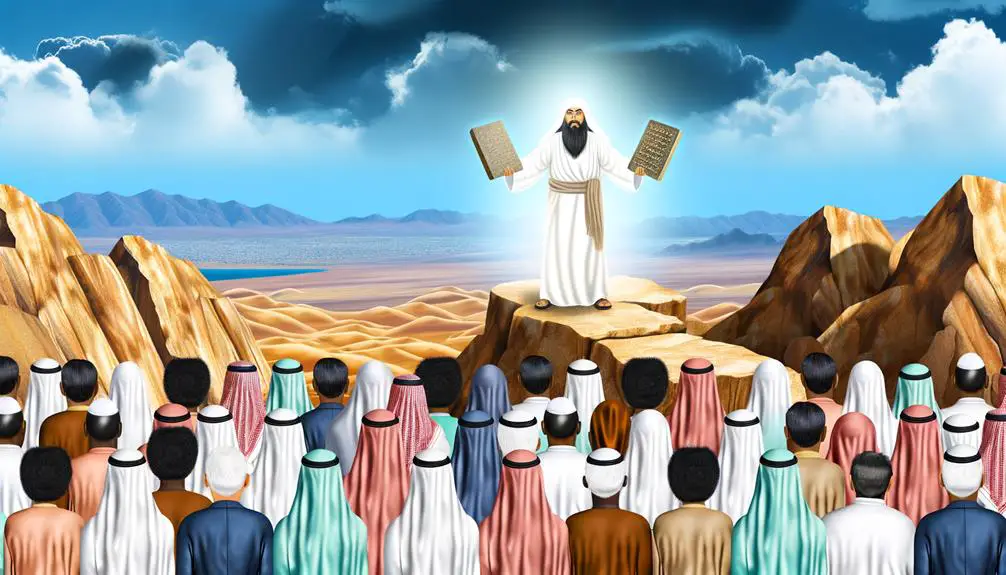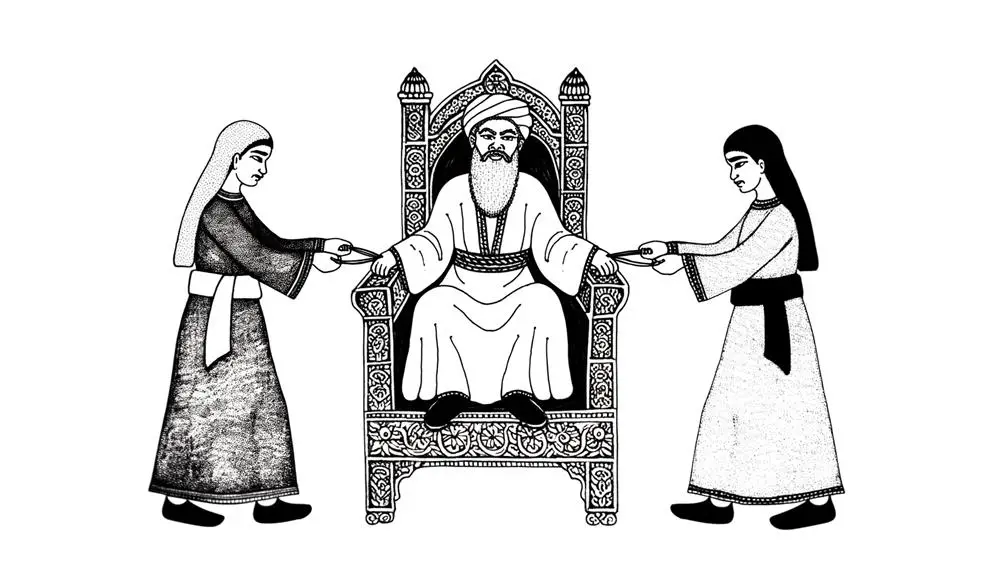Gain insight into the Bible's profound examples of justice and discover how divine intervention shapes morality and fairness.

Examples of Justice in the Bible
In your exploration of justice in the Bible, you'll encounter various poignant narratives that underscore morality and deity intervention. Take Solomon's wise judgment, where he discerns the true mother by proposing to divide the living child; this exemplifies deep psychological insights applied to guarantee justice. Similarly, Nathan's audacious confrontation with King David illuminates the complexities of repentance and moral reckoning within leadership roles. The parable of the Good Samaritan, beyond mere storytelling, challenges prevalent social norms and pushes the boundaries of neighborly love and justice. Each biblical account enriches your understanding of righteousness and divine fairness. Curiosity will surely reveal deeper layers of interpretation.
Key Takeaways
- Solomon's Wise Judgment showcases judicial wisdom by wisely discerning the true mother of a child, emphasizing fairness and integrity.
- Nathan's confrontation with King David uses a parable to reveal David's own injustice, prompting his repentance and highlighting moral accountability.
- Daniel in the Lion's Den illustrates divine justice protecting the innocent and faithful, while punishing the wicked through a dramatic reversal of fortunes.
- The story of the Exodus depicts divine intervention against systemic injustice, liberating the Israelites from Egyptian slavery.
- The Parable of the Good Samaritan teaches justice through compassion, urging people to help others across societal divides.
Justice at Mount Sinai

At Mount Sinai, you'll find that God's delivery of the Ten Commandments was not just a pivotal mandate but a foundational moment for biblical justice, emphasizing fairness and moral righteousness within the community. This event marks a significant episode of covenant renewal, where the Israelites reaffirmed their commitment to God's statutes, which in turn, structured their societal and personal behaviors.
The Law giving at Sinai is particularly essential because it established a set of ethical and moral standards that were meant to govern not just the religious but also the civil life of the community. These laws weren't arbitrary; they were rooted in the idea of promoting welfare and justice among the people. For instance, laws concerning the treatment of widows, orphans, and foreigners demonstrated a forward-thinking equity, ensuring that the vulnerable were protected under divine legislation.
Moreover, this covenant wasn't solely about restrictions or duties imposed upon the people. It was fundamentally about forming a just society where everyone could flourish. The laws given at Sinai laid down the groundwork for social justice, dictating that fairness and righteousness should permeate every aspect of life, thereby renewing and strengthening the community's bond with each other and with God.
Daniel in the Lion's Den
In the biblical narrative of Daniel in the Lion's Den, judicial integrity and divine intervention converge, illustrating how unwavering faith amidst adversity guarantees justice prevails. This story, found in the Book of Daniel, Chapter 6, serves as a profound example of divine justice intervening in human affairs. Daniel, known for his steadfast faith in God, is thrown into a den of lions as a result of a conspiracy by royal administrators who envy his high position in the kingdom of Darius the Mede.
The lions' significance in this narrative isn't just as instruments of potential execution but as entities that God sovereignly controls, symbolizing that true power rests not with man, but with the divine. The den, typically a place of certain death, transforms into a haven of safety under God's protection. This transformation underscores the theme that faith's reward is not merely survival but vindication.
Daniel's emergence unscathed from the lions' den the following morning serves as a proof to his innocence and God's justice. It leads to a reversal of fortunes. The accusers are themselves cast into the den, meeting the fate they had designed for Daniel. This dramatic turn of events highlights a pivotal biblical truth: justice, often divine in its execution, is invariably meted out to those who live with integrity and trust in God's sovereignty.
Solomon's Wise Judgment

You'll find that Solomon's decision-making process stands as a pivotal example of judicial wisdom in biblical narratives. His method of discerning the true mother by proposing to divide the living child reveals deep insights into human psychology and the protective instincts of genuine maternal love. The implications of his ruling extend beyond the immediate resolution, fostering a broader discourse on the values of justice and wisdom in leadership.
Solomon's Decision Process
Solomon's decision-making process, particularly in the case of the two women claiming the same baby, showcases his profound wisdom and judicial acumen. His method reflects a deep understanding of royal ethics and the nuances of decision wisdom. By proposing to divide the baby, Solomon didn't merely test the women's reactions; he explored the moral fibers of their claims, seeking to uncover the truth through their emotional responses.
Aspect |
Analysis |
|---|---|
Decision Context |
High-stakes, emotional |
Methodology |
Psychological testing, ethical probing |
Outcome Aim |
Reveal true maternal connection |
Ethical Framework |
Justice as paramount, protection of the innocent |
This approach not only resolved the dispute but reinforced the integrity of Solomon's judiciary, upholding justice with impeccable precision.
Mother's True Identity Revealed
Through his astute judgment, the true mother's identity was unequivocally revealed when she chose the child's life over her claim. Solomon's test of maternal instincts not only served as an identity verification but also underscored the depth of true maternal love.
Here are four key takeaways from this judgment:
- Insight into Human Nature: Solomon's method reveals profound understanding of human emotions and motivations.
- Maternal Instincts as Evidence: The real mother's willingness to sacrifice her claim for her child's safety is a sign of authentic maternal instincts.
- Ethical Reflection: The scenario prompts reflection on ethical decision-making and prioritizing another's well-being.
- Judicial Wisdom: Demonstrates the use of wisdom and non-conventional methods in legal decisions to unearth the truth.
Implications of Wise Ruling
King Solomon's astute judgment not only resolved a complex dispute but also set a precedent in judicial wisdom that reverberates through legal and ethical discussions today. His decision in the case of the two mothers claiming the same baby showcased his capability to employ psychological insight effectively, fostering legal fairness and promoting equitable policies. You can observe how Solomon's approach underscores the importance of not only the letter of the law but also the spirit, aiming to reach the heart of the matter. This narrative encourages you to appreciate the role of wisdom in governance, suggesting that true justice involves understanding deeper truths and motivations. Solomon's ruling, consequently, isn't just a biblical anecdote; it's a foundational example for judicial prudence and ethical leadership.
Nathan Confronts David

In the biblical narrative, you observe Nathan's audacious approach as he confronts King David, employing a parable to reveal David's transgressions in a manner that underscores the prophet's strategic wisdom and courage. The exposure of David's sin—his adultery with Bathsheba and the murder of Uriah—highlights a pivotal moment of moral reckoning and divine justice within the scriptural text. This confrontation precipitates David's profound repentance, followed by significant personal and national consequences, illustrating the complex interplay of justice, mercy, and leadership in biblical lore.
Nathan's Courageous Approach
Nathan's courageous confrontation with David exemplifies a pivotal moment in biblical justice, where a prophet dares to challenge a king's moral failings directly. This act of prophetic integrity underscores the gravity of royal accountability. Here's what you can learn from Nathan's approach:
- Courage in Truth-Telling: Despite the risks, Nathan remains unflinchingly honest, modeling the courage required to confront power.
- Strategic Approach: Nathan uses a parable to mirror David's actions, facilitating self-reflection and acknowledgment of wrongdoing.
- Moral Responsibility: The confrontation highlights the prophet's role in maintaining moral standards within leadership.
- Impact of Justice: Nathan's actions set a precedent for accountability, emphasizing that no one, not even a king, is above moral and ethical scrutiny.
David's Sin Revealed
Through the skilled use of a parable, Nathan exposes David's transgressions, compelling the king to confront his own moral failures. This moment in biblical narrative illustrates a profound example of prophetic intervention piercing through royal secrecy. Nathan's approach wasn't just about accusation; it was a strategic revelation that forced David to judge himself, thereby realizing the gravity of his actions.
Element |
Impact on David |
|---|---|
Parable |
Forces self-reflection |
Prophetic Voice |
Breaks royal secrecy |
Moral Judgment |
Confronts personal failure |
This analytical dissection shows how Nathan's confrontation is not merely about exposing sin but about fostering an environment where self-awareness and acknowledgment of wrongdoing are possible, demonstrating the complexities of justice in biblical contexts.
Repentance and Consequences
Upon confronting David, Nathan catalyzes a pivotal moment of repentance, yet the consequential divine judgment underscores the inescapable reality of retribution for even a repentant king. This narrative serves as a profound lesson in forgiveness dynamics and the complex path to moral restoration. Here's what you can draw from this episode:
- True Repentance: David's genuine contrition is met with forgiveness, emphasizing that heartfelt repentance is essential for moral restoration.
- Divine Justice: Despite forgiveness, consequences aren't negated, illustrating that actions have irreversible effects.
- Moral Accountability: You're reminded that everyone, irrespective of status, is accountable under divine law.
- Restorative Justice: The story underscores a model where restoration and consequences coexist, aiming to repair rather than simply punish.
Parable of the Unforgiving Servant

In the Parable of the Unforgiving Servant, Jesus illustrates the profound necessity of forgiveness within the Kingdom of Heaven, emphasizing that mercy must mirror the mercy one has received. This parable, as told in Matthew 18:21-35, serves as a stark reminder that forgiveness isn't just a casual recommendation, but a divine mandate. You are shown how the master forgives a massive debt, representing God's mercy, and yet, the servant, now free from his own burden, refuses to show the same compassion to his fellow servant.
The unforgiving servant's failure to extend mercy, even after he had been shown immense compassion, underscores a critical principle in Christian theology: the reciprocation of mercy. The king's response to this servant's actions represents divine retribution for failing to embody the forgiveness emphasized and mercy demonstrated by God.
Here's a breakdown of the key elements in the parable:
Element |
Symbolism |
Implication |
|---|---|---|
King |
God |
Shows limitless mercy |
First Debt |
Our sins |
Large, unpayable by ourselves |
Second Debt |
Others' offenses against us |
Smaller, yet often seen as significant |
This parable compels you to reflect on your own actions. Are you like the unforgiving servant, holding onto grudges when you've been forgiven much greater debts? The justice displayed here is not just punitive but corrective, aiming to restore the balance and harmony that mercy intends to uphold in the community.
Jesus and the Adulterous Woman
Another pivotal moment in the New Covenant that encapsulates divine justice and mercy is the story of Jesus and the adulterous woman, where you're confronted with the challenge of balancing justice with forgiveness. In this narrative from the Gospel of John, the scribes and Pharisees bring a woman caught in adultery before Jesus, testing Him to see if He would uphold the law of Moses or preach His message of mercy.
Here's what you can draw from this profound incident:
- Challenging Societal Norms: Jesus confronts the societal norms of the time, which dictated stoning as a punishment for adultery. His response highlights a shift from strict legalism to a more compassionate, understanding approach.
- Divine Forgiveness: Jesus' decision to forgive the woman underscores the theme of divine forgiveness, central to His teachings. This act not only spares her life but also offers her a chance for redemption and a new beginning.
- Personal Reflection: By asking those without sin to cast the first stone, Jesus turns the moment into one of personal introspection, urging everyone present to reflect on their own sins before condemning others.
- Justice with Mercy: This story exemplifies how true justice isn't merely about punishment, but must be balanced with mercy and understanding, a principle that reshapes the legalistic views of His time.
This passage not only challenges you to think about divine forgiveness within the framework of societal norms but also invites you to contemplate how these principles apply in your own life.
Liberation of the Israelites

Shifting focus to the Old Covenant, we observe the remarkable narrative of the Exodus, where God liberates the Israelites from Egyptian bondage. This event underscores a pivotal moment in biblical justice, emphasizing liberation and divine intervention in the face of oppression. Central to this story is Moses' leadership, a key figure appointed by God to confront Pharaoh and demand the release of the Israelites. Moses, initially reluctant, becomes a symbol of justice and perseverance, embodying the qualities necessary to lead a subjugated people towards freedom.
Pharaoh's defiance in this regard is not merely a personal stubbornness but represents systemic injustice and the absolute power wielded by rulers. Despite numerous signs and warnings, Pharaoh's heart remains hardened, illustrating the conflict between despotic human authority and divine will. Each refusal to let the Israelites go culminates in a series of plagues, devastating Egypt and demonstrating the consequences of Pharaoh's obstinacy.
The Exodus story, thus, isn't just a historical recount; it's a profound lesson in justice. It teaches you the importance of steadfastness in the face of tyranny and the role of leadership in overcoming adversity. Moses' journey from exile to leader, under divine guidance, highlights the transformative power of justice when aligned with a righteous cause.
Parable of the Good Samaritan
The Parable of the Good Samaritan, a poignant narrative in the Gospel of Luke, illustrates the profound biblical principle of neighborly love and justice across societal divides. You'll find that this story not only challenges the norms of its cultural context but also offers a timeless message about how to act justly in a complex world.
Here's a deeper look into the parable's significance:
- Cultural Context: In ancient times, Samaritans and Jews typically harbored mutual disdain, which makes the Samaritan's compassionate actions towards a Jewish man even more striking. This reversal underscores that neighborly love transcends cultural and ethnic barriers.
- Definition of Neighbor: The parable expansively redefines 'neighbor' to include not just those who live near us or share our background, but anyone in need. You're called to show mercy beyond conventional boundaries.
- Active Compassion: The Samaritan doesn't just offer pity; he takes concrete actions—providing first aid, transportation, and financial support. This teaches you that justice involves practical engagement and personal sacrifice.
- Challenge to the Status Quo: By portraying a despised outsider as the hero, the narrative invites you to question societal prejudices and to act righteously, regardless of popular opinion.
Frequently Asked Questions
How Does Modern Law Relate to Biblical Concepts of Justice?
Modern law's roots intertwine with biblical justice, evolving through centuries. Legal systems adapt scriptural principles, reflecting law evolution and scriptural adaptation, balancing ancient doctrines with contemporary societal values and ethical standards.
What Are Common Misconceptions About Biblical Justice?
You might think biblical justice is solely about divine retribution, but it's also deeply concerned with social equity. Misconceptions often ignore how it integrates mercy, fairness, and societal wellbeing in its principles.
Can Biblical Justice Principles Apply to International Law?
Yes, biblical justice principles can shape global governance by setting ethical standards that transcend cultural differences, despite skepticism about their modern applicability. They offer a foundational perspective on fairness and human dignity in international law.
How Do Different Denominations Interpret Biblical Justice?
You'll find that denominational doctrines greatly influence how biblical justice is interpreted, differing significantly across communities due to variances in scriptural translations and theological emphasis on specific biblical texts.
What Role Do Prophets Typically Play in Enforcing Justice in the Bible?
Prophets in the Bible wield cosmic influence, often delivering prophetic warnings that catalyze social reforms. They scrutinize rulers and societies, demanding justice and righteousness, significantly shaping the moral landscape through divine communication.



Sign up